





























|
2009
Reading Group Selections
|
|
|
January
6, 2009

Night
by Elie Wiesel
Night is
the harrowing true account of the Nazi death camps as experienced
by a young Jewish boy. Born in the town of Sighet in Transylvania,
Elie Wiesel was only a teenager when he and his family were
forced out of their home and into a concentration camp called
Auschwitz. Then later Elie was transferred to Buchenwald where
he witnessed and experienced such horrors that Wiesel was
unable to speak of his experience and kept silence for almost
10 years.
|
|

Cold
Rock River
by J. L. Miles
On
February 3, 2009 at 7:30 p.m. the Smyrna Book Discussion Group
will welcome critically acclaimed author J. L. Miles to the
Smyrna Public Library. Ms Miles will discuss her novel Cold
Rock River. The book parallels the lives, loves, and losses
of two young women born a century apart, yet somehow deeply
connected.
J. L. Miles’ first book Rose Flower Creek gained raved
reviews not only for its lyrical prose, but for its unforgettable
characters. Her other writing credits include Divorcing Dwayne,
the first in a trilogy featuring a true southern belle named
Francine Harper.
Jackie Lee Miles, a Georgia resident for 30 years, has roots
in Wisconsin and South Dakota, but considers herself "a
northern girl with a southern heart."
|
|
March
3, 2009

Anthem
by Ayn Rand
In
the novelette Anthem, Ayn Rand presents a dark, frightening
future where there is no love, no science, where individuals
have no names, no independence, or values. It is the story
of Equality 7-2521, whose defiant effort to break away from
a society where individual thought has been labeled sinful
and become his own person, marks him for death. For in Equality
7-2521’s world to even utter the word “I” is
considered an extremely serious offense.
|
|
April
7, 2009
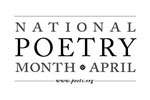
Much
Ado About Nothing
by William Shakespeare
In
recognition of National Poetry month, the book group will
be reading one of the world’s greatest writers—William
Shakespeare, who often wrote in unrhymed iambic pentameter.
|
|
June
6, 2009
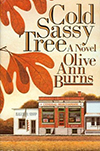
Cold
Sassy Tree
by Olive Ann Burns
When
Will's grandfather marries a woman young enough to be his
daughter just six weeks after the death of his long time wife,
tongues in Cold Sassy, Georgia are sent a'flappin.
|
|
July
7, 2009
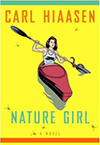
Nature
Girl
by Carl Hiaasen
The
trend, noticeable in Hiaasen's last few novels, to move ever
so slightly away from the apocalyptic edge is evident again
in his latest screwball thriller. In fact, this one feels
like a Shakespearean comedy, a mix of A Midsummer's Night
Dream and As You Like It in which a group of confused lovers
tangle with a gang of "rude mechanicals" deep in
the Forest of Arden. Except here Arden is one of the Ten Thousand
Islands in the famous Florida wilderness area. And our heroine,
playing a variation on Rosalind, is a slightly screwy gal
named Honey Santana, who possesses the tragic flaw of demanding
"more decency and consideration from her fellow humans
than they demand of themselves." That's a tall order
when your fellow humans include a foul-smelling fishmonger
who may be the world's most deranged stalker and a ne'er-do-well
telephone solicitor who has the bad luck of calling Honey
at the dinner hour. Before you can say "Lord, what fools
these mortals be!" Honey, the phone guy, and his comely
mistress have landed in Hiaasen's bug-infested Forest of Arden
along with the fishmonger/stalker, a Seminole Indian on the
lam, and sundry others. There is much chaos, of course, but
throughout a long night on the island, there is never a sense
of horror lurking behind the high jinks. We stick around for
the show, however, even without much suspense, because Hiaasen
is still as funny as any thriller writer alive, and because,
even at his goofiest, his characters are never mere jokes
with legs. There's always something human there, behind the
laughter or beyond the horror, and this time that something
is almost sweet. "Such sweet thunder," one might
call it. Bill Ott
SOURCE:
Copyright © American Library Association. All rights
reserved
|
|
August
4, 2009
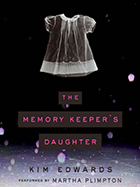
The
Memory Keeper's Daughter
by Kim Edwards
One
snowy night Norah Henry goes into labor and her husband David,
an orthopedic surgeon, with the aid of a nurse, delivers the
twins. When David sees that his son is born healthy, but his
daughter is born with Down's Syndrome, he makes a heartwrenching
decision that eventually tears his family apart.
|
|
October
6, 2009
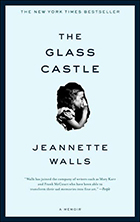
The
Glass Castle
by Jeannette Walls
Freelance
writer Walls doesn't pull her punches. She opens her memoir
by describing looking out the window of her taxi, wondering
if she's "overdressed for the evening" and spotting
her mother on the sidewalk, "rooting through a Dumpster."
Walls's parents—just two of the unforgettable characters
in this excellent, unusual book—were a matched pair of
eccentrics, and raising four children didn't conventionalize
either of them. Her father was a self-taught man, a would-be
inventor who could stay longer at a poker table than at most
jobs and had "a little bit of a drinking situation,"
as her mother put it. With a fantastic storytelling knack,
Walls describes her artist mom's great gift for rationalizing.
Apartment walls so thin they heard all their neighbors? What
a bonus—they'd "pick up a little Spanish without
even studying." Why feed their pets? They'd be helping
them "by not allowing them to become dependent."
While Walls's father's version of Christmas presents—walking
each child into the Arizona desert at night and letting each
one claim a star—was delightful, he wasn't so dear when
he stole the kids' hard-earned savings to go on a bender.
The Walls children learned to support themselves, eating out
of trashcans at school or painting their skin so the holes
in their pants didn't show. Buck-toothed Jeannette even tried
making her own braces when she heard what orthodontia cost.
One by one, each child escaped to New York City. Still, it
wasn't long before their parents appeared on their doorsteps.
"Why not?" Mom said. "Being homeless is an
adventure."
SOURCE: Copyright © Reed Business Information,
a division of Reed Elsevier Inc. All rights reserved.
|
|
November
3, 2009
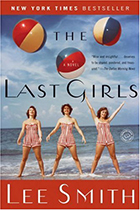
The
Last Girls
by Lee Smith
The
Big Chill meets Huckleberry Finn in a moving novel inspired
by a real-life episode. Thirty-six years ago, Smith (Oral
History) and 15 other college "girls" sailed a raft
down the Mississippi River from Kentucky to New Orleans in
giddy homage to Huck. Here she reimagines that prefeminist
odyssey, and then updates it, as four of the raft's alumnae
take a steamboat cruise in 1999 to recreate their river voyage
and scatter the ashes of one of their own. What results is
an unsentimental journey back to not-quite-halcyon college
days of the mid-1960s ("periods cramps boys dates birth
babies the works") masterfully intercut with more recent
stories of marriages, infidelities, health crises and career
moves, all set firmly in the South. At first the characters
threaten to be mere stereotypes: innocent, self-sacrificing
Harriet; arty, maternal Catherine; brittle Southern belle
Courtney; brassy romance novelist Anna. But Smith reveals
surprising truths about each character, even as she suggests
that the fate of their departed classmate-the wild, promiscuous,
possibly suicidal Baby-may never be understood. The steamboat
setting provides ample opportunities to skewer cruise ship
tackiness and Southern kitsch, a witty counterpoint to the
often troubled personal stories of the passengers. Readers
who like their plots linear may be challenged by the tangle
of tales, but those who agree that "there are no grown-ups,"
and that there's "no beginning and no end" to the
"real story" of people's lives, will find this tender,
generous, graceful novel a delight.
SOURCE: Copyright 2002 Reed Business Information,
Inc.
|
|
December
1, 2009
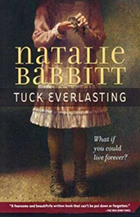
Tuck
Everlasting
by Natalie Babbitt
Rarely
does one find a book with such prose. Flawless in both style
and structure, it is rich in imagery and punctuated with light
fillips of humor. The author manipulates her plot deftly,
dealing with six main characters brought together because
of a spring whose waters can bestow everlasting life. . .Underlying
the drama is the dilemma of the age-old desire for perpetual
youth.
SOURCE:
The Horn Book
|
|











